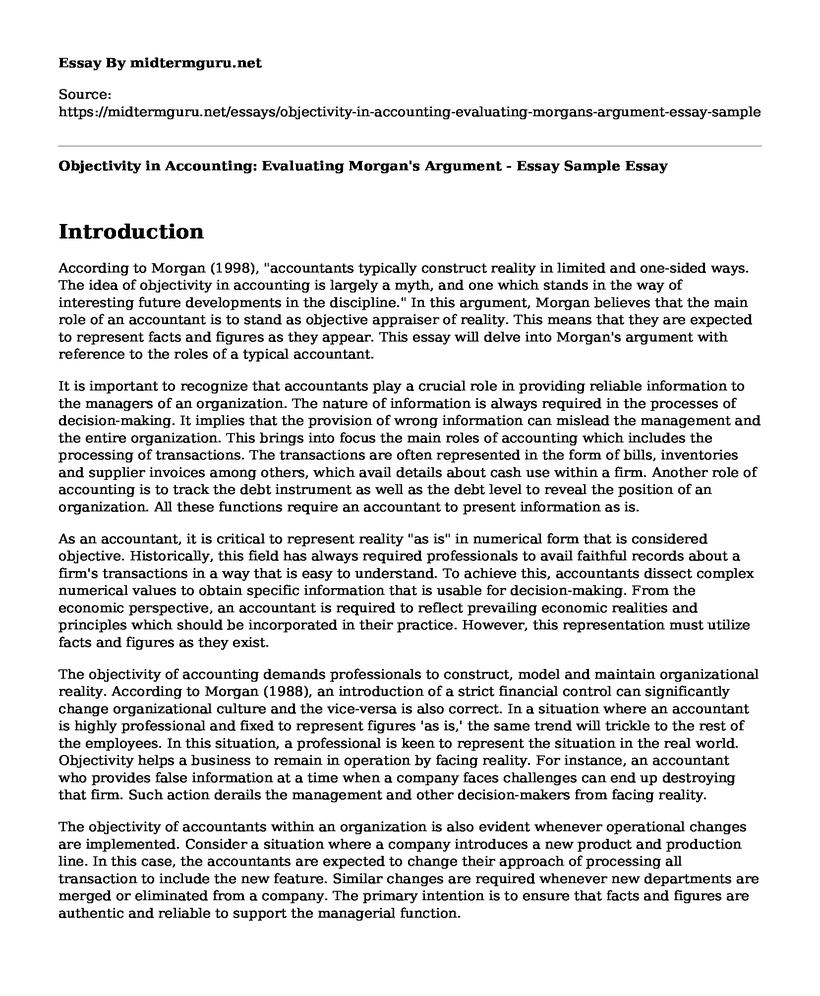Introduction
According to Morgan (1998), "accountants typically construct reality in limited and one-sided ways. The idea of objectivity in accounting is largely a myth, and one which stands in the way of interesting future developments in the discipline." In this argument, Morgan believes that the main role of an accountant is to stand as objective appraiser of reality. This means that they are expected to represent facts and figures as they appear. This essay will delve into Morgan's argument with reference to the roles of a typical accountant.
It is important to recognize that accountants play a crucial role in providing reliable information to the managers of an organization. The nature of information is always required in the processes of decision-making. It implies that the provision of wrong information can mislead the management and the entire organization. This brings into focus the main roles of accounting which includes the processing of transactions. The transactions are often represented in the form of bills, inventories and supplier invoices among others, which avail details about cash use within a firm. Another role of accounting is to track the debt instrument as well as the debt level to reveal the position of an organization. All these functions require an accountant to present information as is.
As an accountant, it is critical to represent reality "as is" in numerical form that is considered objective. Historically, this field has always required professionals to avail faithful records about a firm's transactions in a way that is easy to understand. To achieve this, accountants dissect complex numerical values to obtain specific information that is usable for decision-making. From the economic perspective, an accountant is required to reflect prevailing economic realities and principles which should be incorporated in their practice. However, this representation must utilize facts and figures as they exist.
The objectivity of accounting demands professionals to construct, model and maintain organizational reality. According to Morgan (1988), an introduction of a strict financial control can significantly change organizational culture and the vice-versa is also correct. In a situation where an accountant is highly professional and fixed to represent figures 'as is,' the same trend will trickle to the rest of the employees. In this situation, a professional is keen to represent the situation in the real world. Objectivity helps a business to remain in operation by facing reality. For instance, an accountant who provides false information at a time when a company faces challenges can end up destroying that firm. Such action derails the management and other decision-makers from facing reality.
The objectivity of accountants within an organization is also evident whenever operational changes are implemented. Consider a situation where a company introduces a new product and production line. In this case, the accountants are expected to change their approach of processing all transaction to include the new feature. Similar changes are required whenever new departments are merged or eliminated from a company. The primary intention is to ensure that facts and figures are authentic and reliable to support the managerial function.
Conclusion
In conclusion, Morgan argues that the role of accountants is to construct reality in a limited and one-sided way. The main intention of this approach is to ensure that information is represented 'as is.' The managerial function often relies on the analysis provided by the accountants to establish the performance of an organization which includes profits, losses and cash flows. Therefore, provision of biased information and misrepresentation can be misleading. The objectivity nature of accountants demands fidelity to facts, figures, and changes that affect the transactions of an organization. In addition, the objectivity of an accountant is a useful indicator and catalyst of organizational culture.
References
Morgan, G. (1988). Accounting as reality construction: Towards a new epistemology for accounting practice. Accounting Organizations and Society, 13(5), 477-485.
Cite this page
Objectivity in Accounting: Evaluating Morgan's Argument - Essay Sample. (2023, Feb 09). Retrieved from https://midtermguru.com/essays/objectivity-in-accounting-evaluating-morgans-argument-essay-sample
If you are the original author of this essay and no longer wish to have it published on the midtermguru.com website, please click below to request its removal:
- Essay on Success of the Planning-Programming-Budgeting System at the Department of Defence
- Security Failures that Occurred in this Scenario of Hospital - Paper Example
- Outcome Measures and Performance Issues Report
- Paper Example on Generally Accepted Accounting Principles
- Motivating Employees: Manager's Guide to Enhancing Productivity - Essay Sample
- Leadership in Organizations: How to Guide and Inspire - Essay Sample
- Unlock Your Potential With Work-Integrated Learning (WIL) - Essay Sample







